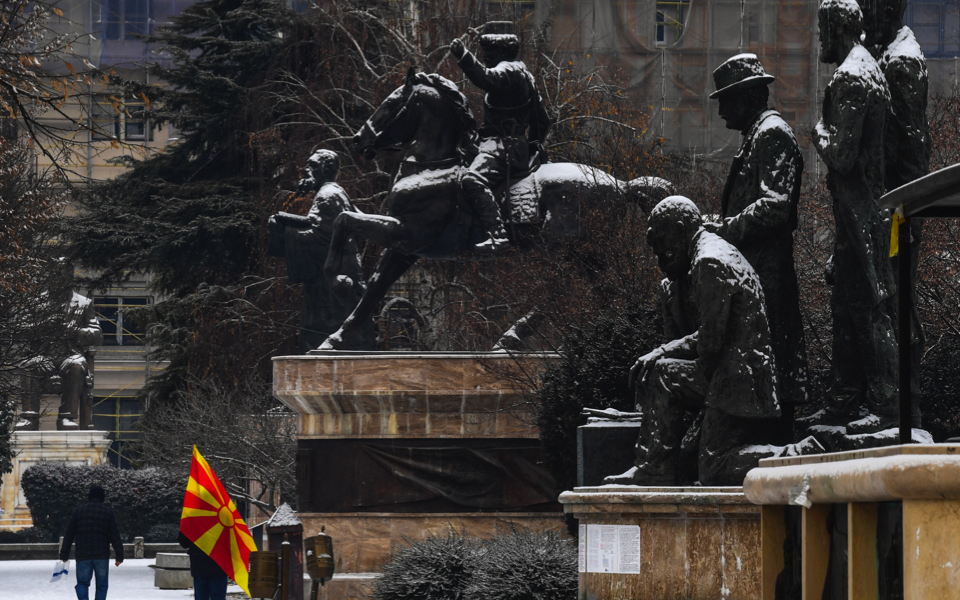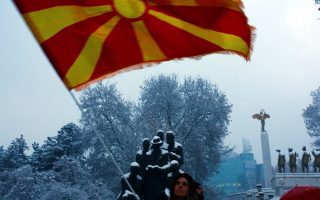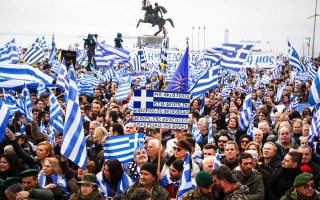A solution that is not harmful to Greece

The Former Yugoslav Republic of Macedonia’s Parliament has ratified the Prespes accord and incorporated the key provisions in the country’s constitution. The constitutional revision improved crucial points which the agreement had left unclear, such as the nationality and national identity of the people in the neighboring country, the preamble to the constitution and Article 36 of the constitution.
Furthermore, for the first time in FYROM’s history, its constitution accepts indirectly that the so-called “Macedonian” people are multiethnic: Slav Macedonians, Albanians, Vlachs, Bulgarians, Serbs, Roma, Bosnians and Turks.
The intense reactions in Greece center around the following main points: the name of the neighboring state, the names of the language and nationality, irredentism and a claim to a “Macedonian minority” in Greek – “Aegean” – Macedonia.
Name: Until the disintegration of Yugoslavia, Greece, in numerous diplomatic documents to Belgrade, referred to what was then a federal state as the Socialist Republic of Macedonia. When it declared its independence, Athens suggested, and the United Nations accepted, that the new country be included among its members under the temporary name “Former Yugoslav Republic of Macedonia” (FYROM). However, this name includes the word “Republic” and left the word “Macedonia” unchanged. In 2007, all the Greek parties, except Popular Orthodox Rally (LAOS – which later failed to enter Parliament), had accepted a geographical qualifier before the word “Macedonia.” With this jointly accepted position, and despite strong pressure from the United States and other allies, Greece succeeded in achieving a unanimous decision at a NATO summit on April 2008, which stated that an accession invitation would be extended to FYROM only when the name issue had been resolved in a mutually acceptable manner.
Language: Greece has officially recognized a Macedonian language since 1977, in the context of the United Nations, which has since been officially included in the list of official UN languages. The agreement improves this point by stating explicitly that the Macedonian language is Slavic and belongs to the group of Southern Slavic languages. The constitution now adds Albanian as an official language.
Nationality: The term “Macedonian,” as stated in the English version of the name deal, can be considered to mean ethnicity. But Article 2 Paragraph 2 of the constitution clarifies that nationality does not mean ethnicity. They eventually voted the definition “Macedonian/citizen of the Republic of North Macedonia.”
Irredentism: The preamble to FYROM’s constitution and Article 36 until recently included the state ideology of the irredentist “Macedonism,” according to which the united Macedonia was divided and subjugated in 1913 to Greek, Bulgarian and Serb conquerors. According to this narrative, “Macedonians” expelled the Serbian conquerors in 1944 and, in the context of the Federal Yugoslavia, proclaimed the federal independent Socialist Republic of Macedonia, which in 1993 was declared an independent state – the Republic of Macedonia. In addition – the narrative continues – the subjugated Slavo-Macedonians in Greece revolted, took part in the “Macedonian National Liberation Struggle” and retired to Skopje. The constitution also said that the republic of Macedonia protects and assists “Macedonians” in neighboring countries and elsewhere. The above was mentioned in the decision of the Anti-fascist Assembly for the National Liberation of Macedonia (ASNOM) in 1943, which was included word for word in the constitution until it was amended. Now the phrase “ASNOM decision” has been removed and replaced by the phrase “announcement of the decision.”
These are the amendments made to the constitution, in brief:
– The republic respects the sovereignty, territorial integrity and political independence of the neighboring countries. It protects the rights and interests of its citizens living and residing abroad and promotes their relationship with their homeland. The republic takes care of the Macedonian citizens living abroad.
– The republic does not interfere in the sovereign rights of other countries and their internal affairs. The republic does not have territorial claims in neighboring countries.
– The deal abolished Article 49, which stated, “The republic cares for the status and rights of those persons belonging to the Macedonian people in neighboring countries, as well as Macedonian expatriates, assists their cultural development and promotes links with them.”
These key amendments have been collected from the official announcements and statements made in the Parliament in Skopje where they were approved. All that remains is to read the new constitution and compare it with the Prespes agreement so that we can express a final opinion.
The deal is certainly a painful compromise. It deeply affected the feelings of Greeks, but it is not harmful to Greece. On the contrary, it heals many other wounds, it saves valuable diplomatic capital for other much more serious fronts, secures our fluid Balkan hinterland, opens a wide area to a number of already planned international energy and transport networks and massively upgrades Greece’s geopolitical value. Thessaloniki will be key.
Nikos Mertzos is the former president of the Society for Macedonian Studies.





